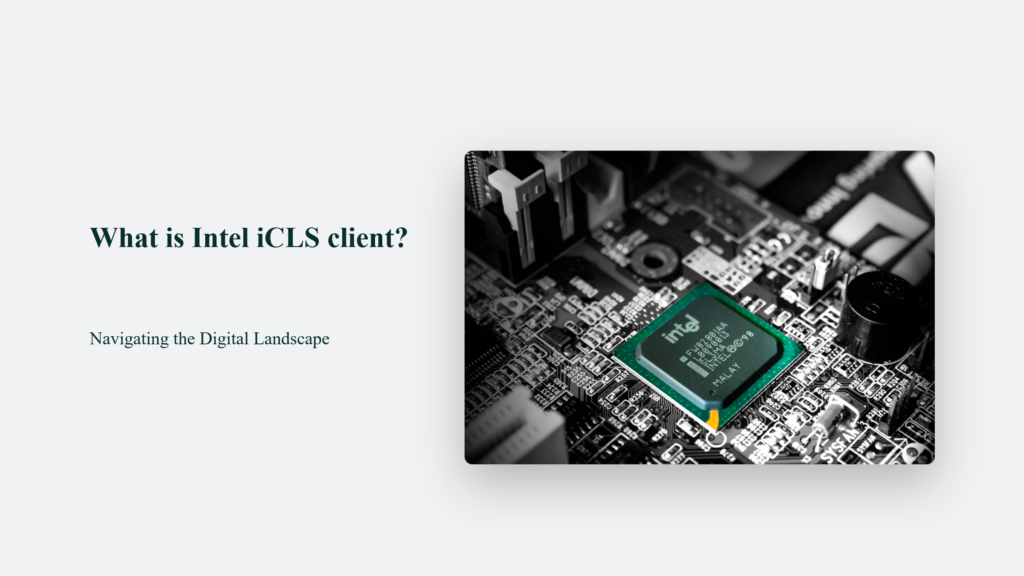

What is Intel iCLS client? Navigating the Digital Landscape

As Seen On
In digital innovation, Intel stands as a colossus, driving advancements that underpin much of our daily technology use. Among its myriad contributions, the Intel iCLS Client emerges as a pivotal yet often overlooked component. But what exactly is the Intel iCLS Client, and why does it matter to Australian users?
This article delves into the What is Intel iCLS Client, exploring its functionality, security implications, and role within the broader Intel ecosystem.

Key Takeaways: Understanding the Impact
- Enhanced Security: The iCLS Client ensures that only licensed and legitimate features are activated on your Intel device, offering protection against unauthorised access and potential security breaches.
- Optimised Performance: Managing the activation of device capabilities helps optimise the performance of your Intel hardware, ensuring that you’re getting the most out of your technology investment.
- Seamless Integration: It operates quietly in the background, offering a seamless experience without the user’s manual intervention.
What is Intel iCLS Client?
The Intel iCLS Client, standing for Intel Capability Licensing Service Client, is a crucial software component that plays a significant role in the broader ecosystem of Intel’s hardware products. This service facilitates the secure activation and management of specific features and capabilities inherent to Intel technologies.
By working with the Intel Management Engine, the iCLS Client ensures that devices can safely utilise Intel-specific features, such as identity protection and secure computing. Here’s an in-depth look at how it functions, its importance, and the benefits it brings to users.
Understanding the Intel iCLS Client and Intel Management Engine
Activation of Features
The iCLS Client bridges Intel’s hardware capabilities and its software applications. It’s responsible for activating various features within Intel hardware, ensuring they are only accessible when verified and licensed correctly. This process is pivotal for Intel products’ functionality and security, enabling features like encryption and secure boot processes.
Security and Identity Protection
One of the key roles of the iCLS Client is to bolster the security framework of Intel-powered devices. It helps manage digital rights and licenses, enabling only authorised features and capabilities. It is particularly important for identity protection services, where sensitive information must be safeguarded from unauthorised access.
The iCLS Client, together with the Intel Management Engine, creates a secure environment for executing sensitive tasks, thereby enhancing the overall security posture of the device.
Secure Computing
The collaboration between the iCLS Client and the Intel Management Engine facilitates a secure computing environment that supports a range of Intel technologies, including those aimed at enterprise security, data protection, and encryption. This secure environment is crucial for executing critical security functions and protecting against software attacks and vulnerabilities.
The Benefits of Using Intel iCLS Client
- Enhanced Device Security: By ensuring that only authorised features are activated and facilitating secure computing practices, the iCLS Client significantly enhances the security of Intel-powered devices.
- Optimised Performance: It helps optimise the performance of Intel hardware products by efficiently managing the activation of various features and capabilities.
- Improved User Experience: Users benefit from a seamless experience, with the iCLS Client working in the background to ensure Intel-specific features’ secure and efficient operation without requiring manual intervention.
The Importance in the Tech Ecosystem
The Intel iCLS Client is a testament to Intel’s commitment to security and performance. It represents an essential component of the tech ecosystem, particularly in an age where cybersecurity threats are increasingly sophisticated and pervasive. For businesses and consumers alike, the assurance of using Intel’s secure technologies is invaluable, making the iCLS Client a key player in protecting and optimising Intel-powered devices.
In summary, the Intel iCLS Client, in collaboration with the Intel Management Engine, is integral to the secure and efficient operation of Intel’s hardware products. It enables the activation of critical features while ensuring that devices remain secure against potential threats. This combination of security and performance enhancement underscores Intel’s ongoing commitment to innovation and protection in the digital age.
Frequently Asked Questions:
Is the Intel iCLS Client necessary?
Yes, it’s crucial for the optimal functioning of certain Intel features and capabilities on your device, ensuring both performance and security.
Can I uninstall the Intel iCLS Client if I don’t use Intel features?
While it’s technically possible to uninstall it, doing so might affect the functionality of Intel-specific features that rely on this service.
How does the Intel iCLS Client impact my device’s performance?
The iCLS Client is designed to optimize your device’s performance by managing the activation of Intel’s features efficiently, without a noticeable impact on system resources.
Konger
Up until working with Casey, we had only had poor to mediocre experiences outsourcing work to agencies. Casey & the team at CJ&CO are the exception to the rule.
Communication was beyond great, his understanding of our vision was phenomenal, and instead of needing babysitting like the other agencies we worked with, he was not only completely dependable but also gave us sound suggestions on how to get better results, at the risk of us not needing him for the initial job we requested (absolute gem).
This has truly been the first time we worked with someone outside of our business that quickly grasped our vision, and that I could completely forget about and would still deliver above expectations.
I honestly can't wait to work in many more projects together!
Disclaimer
*The information this blog provides is for general informational purposes only and is not intended as financial or professional advice. The information may not reflect current developments and may be changed or updated without notice. Any opinions expressed on this blog are the author’s own and do not necessarily reflect the views of the author’s employer or any other organization. You should not act or rely on any information contained in this blog without first seeking the advice of a professional. No representation or warranty, express or implied, is made as to the accuracy or completeness of the information contained in this blog. The author and affiliated parties assume no liability for any errors or omissions.

